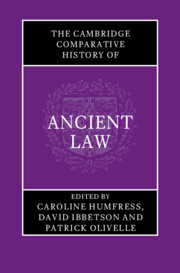Book contents
- The Cambridge Comparative History of Ancient Law
- The Cambridge Comparative History of Ancient Law
- Copyright page
- Contents
- Figures
- Maps
- Contributors
- Preface
- Additional material
- Additional material
- Abbreviations
- Maps
- 1 Orientation
- 2 Law as Text
- 3 Legal Science
- 4 War, Peace and Interstate Relations
- 5 Law and the State
- 6 Law and Religion
- 7 Legal Procedure
- 8 Status and Family
- 9 Crime, Redress and Social Control
- 10 Property
- 11 Commerce and Contracts
- 12 Conclusion
- Bibliography
- Index
4 - War, Peace and Interstate Relations
Published online by Cambridge University Press: 09 May 2024
- The Cambridge Comparative History of Ancient Law
- The Cambridge Comparative History of Ancient Law
- Copyright page
- Contents
- Figures
- Maps
- Contributors
- Preface
- Additional material
- Additional material
- Abbreviations
- Maps
- 1 Orientation
- 2 Law as Text
- 3 Legal Science
- 4 War, Peace and Interstate Relations
- 5 Law and the State
- 6 Law and Religion
- 7 Legal Procedure
- 8 Status and Family
- 9 Crime, Redress and Social Control
- 10 Property
- 11 Commerce and Contracts
- 12 Conclusion
- Bibliography
- Index
Summary
Chapter 4 surveys a wide range of friendly and hostile interstate relations in ancient societies, where war was often the normal state of affairs. Notwithstanding the numerous conflicts, polities tried in the end, through alliances and diplomatic relations, to establish peaceful relations in view of political stability and economic prosperity. The chapter analyses hospitality rules regarding foreigners, treaties between polities and the establishment of diplomatic relations, which emerged as an international system in the ancient Near East during the mid-fourteenth century bce. An alternative to diplomacy in conflict management, typical of the Greek world, was arbitration and mediation with the help of a third party. In a final section, the chapter outlines how states, when diplomacy failed, started a war procedurally. In conclusion, the chapter argues that, in the absence of an international court, the enforcement of diplomatic rules and treaties was in many ancient societies ensured by the supranational authority of the gods.
Keywords
- Type
- Chapter
- Information
- The Cambridge Comparative History of Ancient Law , pp. 146 - 180Publisher: Cambridge University PressPrint publication year: 2024

